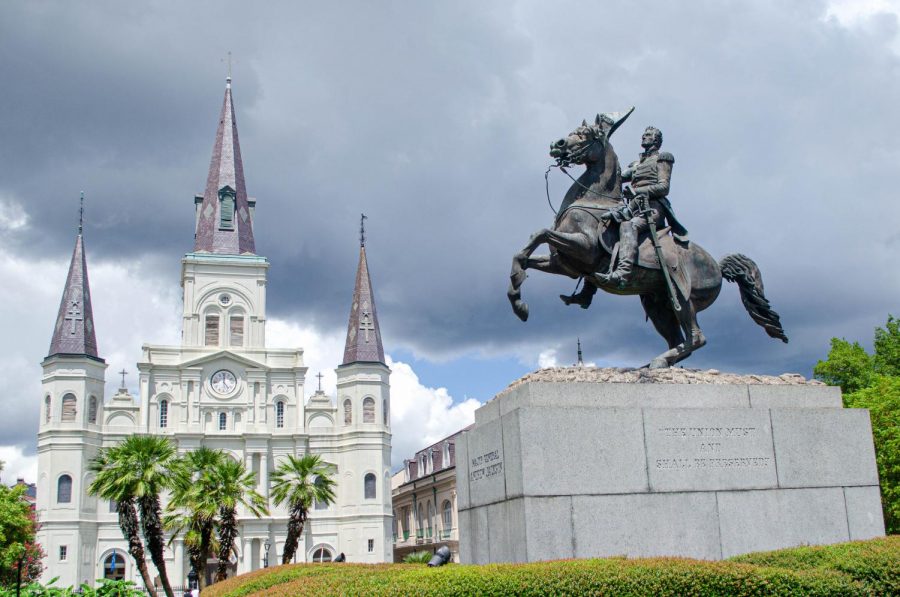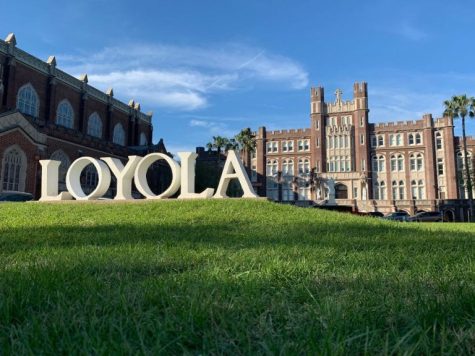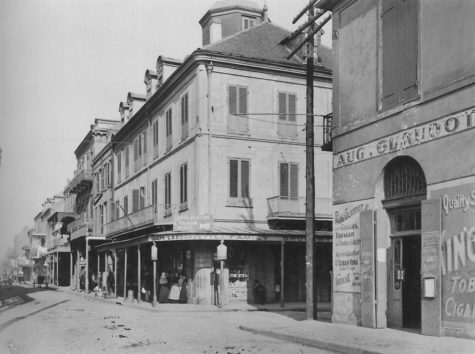We need to reexamine New Orleans history
This statue of Andrew Jackson stands in Jackson Square at the heart of the French Quarter. The statue is just one of the remaining vestiges of the confederacy and the racial injustice that ruled over the South for so long.
Examining one’s own history should be, by its very nature, an uncomfortable process. As college students, we are overtly aware of this fact; if we never addressed and subsequently reconsidered our preconceived notions about life, we would never learn or grow. Outside of the college campus, however, reevaluating how we view the past remains a contentious topic. In New Orleans specifically, many components of our environment and culture are deeply rooted in racial inequality and confederate vestiges. The recent debate over the renaming of New Orleans streets is just one example of a faction of natives struggling to preserve a constricting version of history that, frankly, we should be striving to revise. When the proposed street name changes were first announced via online news sources, the articles’ comment sections were filled with outrage, albeit for two distinct reasons. One camp of individuals did not understand why such a task was necessary in the first place – no one cares about street names, so why spend the money to replace all of the signage?
The second camp was far more vocal and volatile in their commentary as they furiously condemned the idea that Confederate tributes need to be erased. Critics cited “reverse racism” and anti-white sentiment as the reasoning behind the renaming effort, as well as professing that the new names (those of predominantly black individuals) were “unwieldy mouthfuls.” These comments were not ambivalent by any means – they clearly mourned the loss of a white-supremist South and advocated for a return to blatant, systemic racism. While each of those concepts deserve utter censure in their own right, I would like to propose an overarching, two-pronged rebuttal that addresses both concerns as a whole. First, the long-lasting effects of Confederate ideology in New Orleans will never be eradicated. It is a part of our history, plain and simple; any “good” or “bad” that those long-dead men did will continue to exist … in the past, where it belongs. They can be studied, if one so chooses, but they do not deserve a place in our public spaces. Even if the average citizen does not know or care who their street, school or office building is named after, those commemorative titles give us the opportunity to expand our historical vernacular and honor those with more recent, relevant ties to the community.
Leading into my second point, then, it is very clear that the new street names are not “for” the people who are protesting them – they are for the many minority individuals who have been victims of a predominately white, male narrative. There are historical remnants of the antebellum/Confederate period scattered throughout the city, but there are literally centuries of New Orleans natives with inspiring stories and messages that are confined only to history books and family legend. In order to “recalibrate” New Orleans history in favor of inclusivity, people have to be exposed to more facets of the past; the street renaming effort is just one method of achieving that goal.

Gabrielle Korein is a Mass Communication senior who is passionate about writing, photography, and videography. Gabrielle has spent over 7 years as a freelance...







Philip D. Olson • Oct 17, 2021 at 11:45 am
Andrew Jackson died in 1845, 16 years before the Confederacy was even established. Describing his statue as a vestige of the CE federally shows how ignorant the author of his op-ed is. The statue was built to commemorate his legendary victory General Jackson had over the British during the Battle of New Orleans during the War of 1812. Anyone who knows about the battle knows that Andrew Jackson used anyone willing to resist the British. His army was one of the most diverse groups of people in North America at the time. He had blacks, French pirates, rag tag militia men from the back woods of Louisiana and Tennessee and all fighting together to ensure the British would not succeed in attempting to re-colonize the United States 30 years after the revolution. The man is a National Hero and was ultimately awarded the the Presidency by the people of this country as a sign of civic gratitude for his heroic accomplishments. That someone would even have this type of negative and warped perspective toward the man is alarming to say the least.
Richard • Oct 8, 2022 at 9:31 pm
Very good!